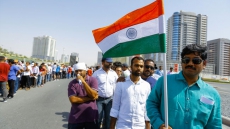With the Father of the Constitution differing with Sheikh Abdullah on the structuring of Article 370, Dr B.R. Ambedkars views on certain narrow considerations as thought through by ordinary men needs to be thrown into stark relief.
Ambedkar was also a strategic security thinker and a defence expert, he defined nationality as, "Consciousness of a kind, awareness of the existence of that meant a tie of kinship" and nationalism for him meant, "the desire for a separate national existence for those who are bound by this tie of kinship". (Govt of Maharashtra: 1990, P30).
One must take note of the fact that he had always taken a keen interest in defence and security affairs. As a young man he had joined the Baroda State Forces as a Lieutenant. He had to leave his job because his father was seriously ill and soon died on February 2, 1913. (Longer V. 1980. P.29).
Towards the end of July 1941, the Viceroy expanded his Executive Council and set up a Defence Advisory Committee. Dr Babasaheb Ambedkar was appointed in the Defence Advisory Committee and took an active interest in defence matters and propounded militarisation programmes in the country and attended the various sessions of the National Defence Council.
As such his thoughts on Kashmir issue, which have both an ideological and historical dimension, are most interesting -- "Give the Hindu and Buddhist part to India. We are really not concerned with the Muslim part of Kashmir. It is a matter between Muslims of Kashmir and Pakistan. They may decide the issue, as they like. Or, if you like, divide it into three parts.
"The cease-fire zones in the Valley and Jammu-Ladakh region and have a plebiscite only in the Valley. What I am afraid is that in the proposed plebiscite which is to be an overall plebiscite the Hindus and Buddhists of Kashmir are likely to be dragged into Pakistan against their wishes and we may have to face the same problem as we are facing today in East Bengal (Govt of Maharashtra : 1990 P.1322)."
These are radical views from an eminent personage which will have no absorption with the current discourse, for they fly in the face of the narrative around us.
However, Dr Babasaheb argued that the possibility of Hindu-Muslim unity was based on two premises a) General belief in the efficacy of a central government to mould a diverse set of people into one nation and (2) The general feeling that the satisfaction of Muslim demands would be a sure means of achieving Hindu-Muslim unity.
Dr Ambedkar summarized the action and reactions of the political forces during the three decades and analyzed in three ways: a) social stagnation b) communal aggression c) National frustration of political destiny. Dr Ambedkar recognized the social reform movement but he felt sorry that it was not seen in Muslim Community.
There was no organized movement for social reform among them. Under those circumstances the Muslim community became stagnant. The basis of the politics of Muslims politicians was rivalry and continued rivalry, which marred the social progress of the Muslim community. The Hindu-Muslim conflict as the basis of politics was an accepted fact during the thirties of the twentieth century. Though the spirit of independence was growing the communal bitterness was also growing.
According to Ambedkar, Pakistan rested upon the distinction between a community and a nation: a community has a right to safeguard; a nation has a right to demand separation. So the two-nation theory had the justification of demanding separation from Hindus.
According to him, there was the virus of dualism in the two-nation theory. He remarked, "It is a positive disintegration of society and country". By adopting, Pakistan as the goal, the Muslims had forgotten the struggle against British. Self-determination meant right to establish a form of government in accordance with the wishes of the people.
According to Ambedkar, "it has meant the right to obtain national independence from an alien race irrespective of the form of government". The claim of Pakistan was said to be founded on the principle of self-determination.
The self-determination must be by the people. The Muslim League for the benefit of India claimed the demand of self-determination. At the same time, the league was opposed to self-determination being applied to Palestine.
The principle of self-determination had no imperative character because, "self-determination is not a universal principle of all". It was not absolute at all. It was to be considered in the light of many factors like language, religion, land and geographical elements.
According to Ambedkar, there were two methods of protecting the minorities. One was to provide safeguards for minorities and the other was to provide for the transfer of Hindu population from Pakistan.
If the boundaries of Punjab and Bengal were redrawn, the question of transfer of population would come in a marked way. Dr Ambedkar gave various example i.e. Turkey, Greece, Bulgaria. The transfer of minorities was the only lasting remedy for communal peace. The only way to make India homogenous was to arrange for exchange of population and until this was done, the problem of Hindu-Muslim would remain and would continue to produce disharmony in the politic of India.
He said that the question of transfer of population could be successfully tackled by a commission with equal members of both countries (SN Busi, six volume edition: Dr B.R. Ambedkar Framing of Indian Constitution).
